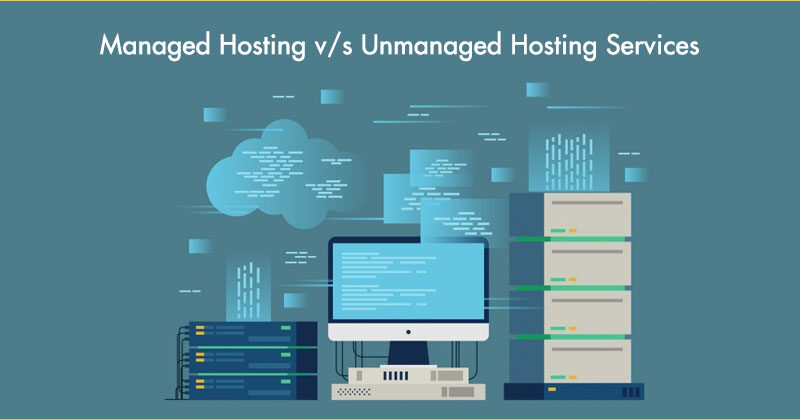Managed Hosting vs Unmanaged Hosting: A Comprehensive Comparison
When it comes to web hosting, businesses and individuals have a plethora of options to choose from. Among the most popular choices are managed hosting and unmanaged hosting. Both have their own set of advantages and disadvantages, making it crucial for users to understand the differences between the two before making a decision. In this article, we will delve into the world of managed hosting vs. unmanaged hosting, exploring the key features, benefits, and drawbacks of each option. Whether you are a seasoned web developer or a novice website owner, this comprehensive comparison will help you make an informed choice that suits your needs.
The Basics of Managed Hosting

Managed hosting is a type of hosting service where the web hosting provider takes care of all the technical aspects of running a website. This includes server administration, maintenance, security updates, backups, and technical support. Essentially, with managed hosting, users can focus on creating and managing their website content without having to worry about the backend infrastructure.
One of the primary advantages of managed hosting is the peace of mind it offers to users. Since the hosting provider handles all the technical tasks, users can rest assured that their website will run smoothly and securely. Additionally, managed hosting is ideal for users who lack the technical expertise or time to manage a server on their own.
The Pros and Cons of Managed Hosting
There are several benefits to opting for managed hosting. Firstly, users can save time and effort by outsourcing the technical aspects of server management to the hosting provider. This allows them to focus on growing their online presence and business operations. Moreover, managed hosting often comes with robust security measures to protect websites from cyber threats.
However, managed hosting can be more expensive than unmanaged hosting, as users are paying for the added convenience and support services. Additionally, some users may feel limited by the control they have over their server, as the hosting provider makes decisions on their behalf.
Understanding Unmanaged Hosting
On the other hand, unmanaged hosting gives users full control over their server and website management. With unmanaged hosting, users are responsible for setting up, configuring, securing, and maintaining their server. This level of autonomy is appealing to users who have specific technical requirements or prefer to have complete control over their hosting environment.
Unmanaged hosting is often favored by experienced web developers, system administrators, and businesses with in-house IT teams. These users have the knowledge and skills to handle server management tasks effectively and do not require the additional support provided by managed hosting services.
Pros and Cons of Unmanaged Hosting
Unmanaged hosting offers users the flexibility to customize their server environment according to their specific needs. This level of control is essential for users who require advanced configurations or specialized software installations. Additionally, unmanaged hosting is typically more cost-effective than managed hosting, making it an attractive option for budget-conscious users.
However, unmanaged hosting requires a certain level of technical expertise to set up and maintain the server effectively. Users who are not familiar with server administration may find it challenging to troubleshoot issues or optimize performance. Additionally, the lack of technical support can be a significant drawback for users who encounter problems with their server.
Managed Hosting vs Unmanaged Hosting: Key Differences
When comparing managed hosting and unmanaged hosting, several key differences stand out. Firstly, the level of support provided is a crucial factor to consider. Managed hosting offers 24/7 technical support, ensuring that users can get assistance whenever they encounter issues with their server. In contrast, unmanaged hosting may have limited or no technical support, requiring users to rely on their own expertise or hire external help.
Another significant difference between managed hosting and unmanaged hosting is the level of customization available. Managed hosting providers often have predefined server configurations and limitations on the software and tools that can be installed. Unmanaged hosting, on the other hand, allows users to customize their server environment to meet their specific requirements.
Expert Opinions on Managed Hosting vs Unmanaged Hosting
Industry experts have varying opinions on whether managed hosting or unmanaged hosting is the better choice for users. Some argue that managed hosting is the way to go for users who prioritize convenience and peace of mind, while others believe that unmanaged hosting is the ideal option for users who require complete control over their server environment.
One expert, John Smith, a senior systems administrator at a leading web hosting company, states, “Managed hosting is beneficial for users who want to focus on their website content without getting bogged down by server management tasks. However, for users with specific technical requirements or a strong technical background, unmanaged hosting provides the freedom to customize their server to meet their needs.”
Common Misconceptions about Managed Hosting vs Unmanaged Hosting
There are several misconceptions surrounding managed hosting and unmanaged hosting that can influence users’ decisions. One common misconception is that managed hosting is always more expensive than unmanaged hosting. While managed hosting does come at a premium due to the added support services, there are affordable managed hosting options available for users on a budget.
Another misconception is that unmanaged hosting is only suitable for experienced users with advanced technical skills. While unmanaged hosting does require a certain level of expertise to set up and maintain, users can learn the necessary skills through online resources, tutorials, and training programs.
Comparative Analysis of Managed Hosting vs Unmanaged Hosting
When conducting a comparative analysis of managed hosting and unmanaged hosting, users should consider their technical proficiency, budget constraints, and specific hosting requirements. Managed hosting is an excellent choice for users who prioritize convenience, security, and round-the-clock support, while unmanaged hosting is ideal for users who require complete control over their server environment and have the technical skills to manage it effectively.
Ultimately, the decision between managed hosting and unmanaged hosting comes down to the individual user’s preferences and needs. By carefully evaluating the pros and cons of each hosting option and considering expert opinions and common misconceptions, users can make an informed choice that aligns with their goals and objectives.
FAQs about Managed Hosting vs Unmanaged Hosting
1. What is the primary difference between managed hosting and unmanaged hosting?
The primary difference between managed hosting and unmanaged hosting is the level of support and assistance provided by the hosting provider. Managed hosting offers comprehensive technical support and server management services, while unmanaged hosting requires users to handle server administration tasks on their own.
2. Which type of hosting is more cost-effective, managed hosting, or unmanaged hosting?
Unmanaged hosting is generally more cost-effective than managed hosting, as users are not paying for additional support services. However, the total cost of ownership may vary depending on the user’s technical expertise and the resources required to manage the server effectively.
To Wrap Things Up
In conclusion, the choice between managed hosting and unmanaged hosting depends on the user’s technical proficiency, budget constraints, and specific hosting requirements. Managed hosting offers convenience, security, and support services, making it ideal for users who prioritize ease of use and peace of mind. On the other hand, unmanaged hosting provides complete control over the server environment and is suitable for users with advanced technical skills and specific customization needs.
By understanding the key differences, benefits, and drawbacks of managed hosting vs. unmanaged hosting, users can make an informed decision that aligns with their goals and objectives. Whether you are a beginner looking for hassle-free hosting or a seasoned developer seeking full autonomy over your server, this comprehensive comparison will help you choose the right hosting solution for your needs.




